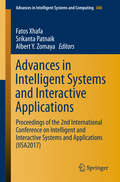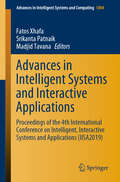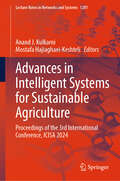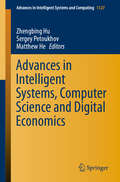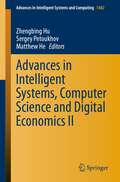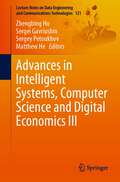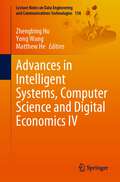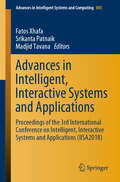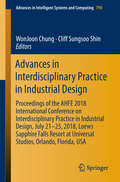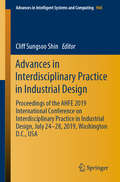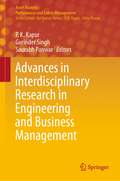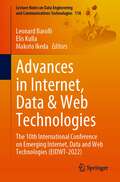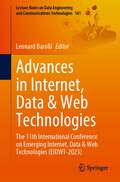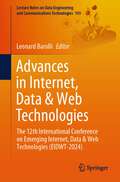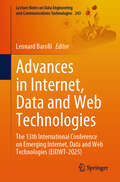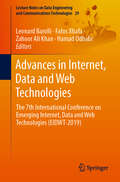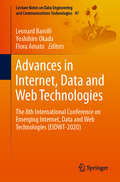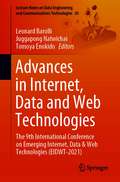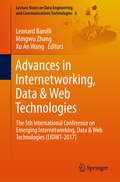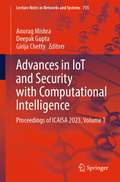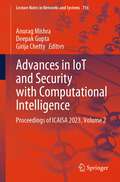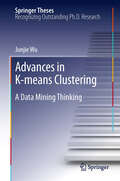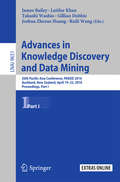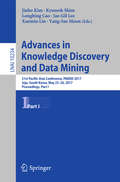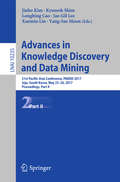- Table View
- List View
Advances in Intelligent Systems and Interactive Applications: Proceedings of the 2nd International Conference on Intelligent and Interactive Systems and Applications (IISA2017) (Advances in Intelligent Systems and Computing #686)
by Albert Y. Zomaya Fatos Xhafa Srikanta PatnaikThis book presents research papers from diverse areas on novel Intelligent Systems and Interactive Systems and Applications. It gathers selected research papers presented at the 2nd International Conference on Intelligent and Interactive Systems and Applications (IISA2017), which was held on June 17-18, 2017 in Beijing, China. Interactive Intelligent Systems (IIS) are systems that interact with human beings, media or virtual agents in intelligent computing environments. The emergence of Big Data and the Internet of Things have now opened new opportunities in both academic and industrial research for the successful design and development of intelligent interactive systems. This book explores how novel interactive systems can be used to overcome various challenges and limitations previously encountered by human beings by combining machine learning algorithms and the analysis of recent trends. The book presents 125 contributions, which have been categorized into seven sections, namely: i) Autonomous Systems; ii) Pattern Recognition and Vision Systems; iii) E-Enabled Systems; iv) Mobile Computing and Intelligent Networking; v) Internet and Cloud Computing; vi) Intelligent Systems, and vii) Various Applications. It not only offers readers extensive theoretical information on Intelligent and Interactive Systems, but also introduces them to various applications in different domains.
Advances in Intelligent Systems and Interactive Applications: Proceedings of the 4th International Conference on Intelligent, Interactive Systems and Applications (IISA2019) (Advances in Intelligent Systems and Computing #1084)
by Madjid Tavana Fatos Xhafa Srikanta PatnaikThis edited book is based on the research papers presented at the 4th International Conference on Intelligent, Interactive Systems and Applications (IISA2019), held on June 28–30, 2019 in Bangkok, Thailand. Interactive intelligent systems (IIS) are systems that interact with human beings, media or virtual agents in intelligent computing environments. This book explores how novel interactive systems can intelligently address various challenges and also limitations previously encountered by human beings using different machine learning algorithms, and analyzes recent trends. The book includes contributions from diverse areas of IIS, here categorized into seven sections, namely i) Intelligent Systems; ii) Autonomous Systems; iii) Pattern Recognition and Computer Vision; iv) E-Enabled Systems; v) Internet & Cloud Computing; vi) Mobile & Wireless Communication; and vii) Various Applications. It not only presents theoretical knowledge on the intelligent and interactive systems but also discusses various applications pertaining to different domains.
Advances in Intelligent Systems for Sustainable Agriculture: Proceedings of the 3rd International Conference, ICISA 2024 (Lecture Notes in Networks and Systems #1201)
by Anand J. Kulkarni Mostafa Hajiaghaei-KeshteliThis book presents the select proceedings of the 3rd International Conference on Intelligent Systems and Applications 2023. The theme of this conference is ‘Intelligent Systems for Agricultural Applications'. It covers the topics of intelligent systems in multiple aspects such as sustainable crop production, weather prediction, post-harvest management and agro-processing, digitalization and automation of agri equipment, agriculture warehouse and supply chain management, yield prediction, and quality assessment. The book is useful for researchers and professionals interested in the broad field of artificial intelligence and machine learning.
Advances in Intelligent Systems, Computer Science and Digital Economics (Advances in Intelligent Systems and Computing #1127)
by Sergey Petoukhov Matthew He Zhengbing HuThis book comprises high-quality, refereed research papers presented at the 2019 International Symposium on Computer Science, Digital Economy and Intelligent Systems (CSDEIS2019): The symposium, held in Moscow, Russia, on 4–6 October 2019, was organized jointly by Moscow State Technical University and the International Research Association of Modern Education and Computer Science. The book discusses the state of the art in areas such as computer science and its technological applications; intelligent systems and intellectual approaches; and digital economics and methodological approaches. It is an excellent reference resource for researchers, undergraduate and graduate students, engineers, and management practitioners interested in computer science and its applications in engineering and management.
Advances in Intelligent Systems, Computer Science and Digital Economics II (Advances in Intelligent Systems and Computing #1402)
by Sergey Petoukhov Matthew He Zhengbing HuThis book comprises high-quality refereed research papers presented at The Second International Symposium on Computer Science, Digital Economy and Intelligent Systems (CSDEIS2020), held in Moscow, Russia, on December 18–20, 2020, organized jointly by Moscow State Technical University and the International Research Association of Modern Education and Computer Science. The topics discussed in the book include state-of-the-art papers in computer science and their technological applications; intelligent systems and intellectual approaches; digital economics and methodological approaches. It is an excellent source of references for researchers, graduate students, engineers, management practitioners, and undergraduate students interested in computer science and their applications in engineering and management.
Advances in Intelligent Systems, Computer Science and Digital Economics III (Lecture Notes on Data Engineering and Communications Technologies #121)
by Sergey Petoukhov Matthew He Zhengbing Hu Sergei GavriushinThe book comprises high-quality refereed research papers presented at the Third International Symposium on Computer Science, Digital Economy, and Intelligent Systems (CSDEIS2021), held in Moscow, Russia, on December 25-26, 2021, organized jointly by the Mechanical Engineering Research Institute of the Russian Academy of Sciences,Moscow State Technical University, and the International Research Association of Modern Education and Computer Science. The topics discussed in the book includes state-of-the-art papers in computer science and their technological applications; intelligent systems and intellectual approaches; digital economics and methodological approaches. It is an excellent source of references for researchers, graduate students, engineers, management practitioners, and undergraduate students interested in computer science and its applications in engineering and management.
Advances in Intelligent Systems, Computer Science and Digital Economics IV (Lecture Notes on Data Engineering and Communications Technologies #158)
by Matthew He Yong Wang Zhengbing HuThis book comprises high-quality peer-reviewed research papers presented at the 4th International Symposium on Computer Science, Digital Economy and Intelligent Systems (CSDEIS2022), held in Wuhan, China, from November 11–13, 2022, organized jointly by the Wuhan University of Technology, Hubei University of Technology, Wuhan University of Science and Technology, the Polish Operational and Systems Society, and the International Center of Informatics and Computer Science (ICICS). The topics discussed in the book include state-of-the-art papers in computer science and their technological applications; intelligent systems and intellectual approaches; digital economics and educational approaches. It is an excellent source of references for researchers, graduate students, engineers, management practitioners, and undergraduate students interested in computer science and its applications in engineering and management.
Advances in Intelligent, Interactive Systems and Applications: Proceedings Of The 3rd International Conference On Intelligent, Interactive Systems And Applications (iisa2018) (Advances in Intelligent Systems and Computing #885)
by Madjid Tavana Fatos Xhafa Srikanta PatnaikThis book presents the proceedings of the International Conference on Intelligent, Interactive Systems and Applications (IISA2018), held in Hong Kong, China on June 29–30, 2018. It consists of contributions from diverse areas of intelligent interactive systems (IIS), such as: autonomous systems; pattern recognition and vision systems; e-enabled systems; mobile computing and intelligent networking; Internet & cloud computing; intelligent systems and applications. The book covers the latest ideas and innovations from both the industrial and academic worlds, and shares the best practices in the fields of computer science, communication engineering and latest applications of IOT and its use in industry. It also discusses key research outputs, providing readers with a wealth of new ideas and food for thought.
Advances in Interdisciplinary Practice in Industrial Design: Proceedings of the AHFE 2018 International Conference on Interdisciplinary Practice in Industrial Design, July 21-25, 2018, Loews Sapphire Falls Resort at Universal Studios, Orlando, Florida, USA (Advances in Intelligent Systems and Computing #790)
by Cliff Sungsoo Shin WonJoon ChungThis book provides readers with a snapshot of cutting-edge methods and procedures in industrial design, with a particular focus on human-centered and user-experience design, service design, sustainable design and applications of virtual & augmented reality. Reporting on both theoretical and practical investigations aimed at improving industrial design through interdisciplinary collaboration, it covers a wide range of topics – from design strategies to product research and planning, exhibit design, as well as new materials and color research. Based on the AHFE 2018 International Conference on Interdisciplinary Practice in Industrial Design, held on July 21–25, 2018, in Orlando, Florida, USA, the book offers a timely guide for industrial designers, production engineers and computer scientists.
Advances in Interdisciplinary Practice in Industrial Design: Proceedings of the AHFE 2019 International Conference on Interdisciplinary Practice in Industrial Design, July 24-28, 2019, Washington D.C., USA (Advances in Intelligent Systems and Computing #968)
by Cliff Sungsoo ShinThis book provides readers with a snapshot of cutting-edge methods and procedures in industrial design, with a particular focus on human-centered and user-experience design, service design, sustainable design and applications of virtual & augmented reality. Reporting on both theoretical and practical investigations aimed at improving industrial design through interdisciplinary collaboration, it covers a wide range of topics – from design strategies to product research and planning, exhibit design, as well as new materials and color research. Based on the AHFE 2019 International Conference on Interdisciplinary Practice in Industrial Design, held on July 24–28, 2019, Washington D.C., USA, the book offers a timely guide for industrial designers, production engineers and computer scientists.
Advances in Interdisciplinary Research in Engineering and Business Management (Asset Analytics)
by P. K. Kapur Gurinder Singh Saurabh PanwarThe volume contains latest research on software reliability assessment, testing, quality management, inventory management, mathematical modeling, analysis using soft computing techniques and management analytics. It links researcher and practitioner perspectives from different branches of engineering and management, and from around the world for a bird's eye view on the topics. The interdisciplinarity of engineering and management research is widely recognized and considered to be the most appropriate and significant in the fast changing dynamics of today's times. With insights from the volume, companies looking to drive decision making are provided actionable insight on each level and for every role using key indicators, to generate mobile-enabled scorecards, time-series based analysis using charts, and dashboards. At the same time, the book provides scholars with a platform to derive maximum utility in the area by subscribing to the idea of managing business through performance and business analytics.
Advances in Internet, Data & Web Technologies: The 10th International Conference on Emerging Internet, Data and Web Technologies (EIDWT-2022) (Lecture Notes on Data Engineering and Communications Technologies #118)
by Leonard Barolli Makoto Ikeda Elis KullaThis book presents original contributions to the theories and practices of emerging Internet, data, and Web technologies and their applicability in businesses, engineering, and academia. Internet has become the most proliferative platform for emerging large-scale computing paradigms. Among these, data and Web technologies are two most prominent paradigms, in a variety of forms such as Data Centers, Cloud Computing, Mobile Cloud, Mobile Web Services, and so on. These technologies altogether create a digital ecosystem whose corner stone is the data cycle, from capturing to processing, analysis, and visualization. The investigation of various research and development issues in this digital ecosystem is boosted by the ever-increasing needs of real-life applications, which are based on storing and processing large amounts of data.As a key feature, it addresses advances in the life cycle exploitation of data generated from the digital ecosystem data technologies that create value for the knowledge and businesses toward a collective intelligence approach. Researchers, software developers, practitioners, and students interested in the field of data and Web technologies find this book useful and a reference for their activity.
Advances in Internet, Data & Web Technologies: The 11th International Conference on Emerging Internet, Data & Web Technologies (EIDWT-2023) (Lecture Notes on Data Engineering and Communications Technologies #161)
by Leonard BarolliThis book presents original contributions to the theories and practices of emerging Internet, data, and web technologies and their applicability in businesses, engineering, and academia. Internet has become the most proliferative platform for emerging large-scale computing paradigms. Among these, data and web technologies are two most prominent paradigms, in a variety of forms such as data centers, cloud computing, mobile cloud, mobile web services, and so on. These technologies altogether create a digital ecosystem whose corner stone is the data cycle, from capturing to processing, analysis, and visualization. The investigation of various research and development issues in this digital ecosystem is boosted by the ever-increasing needs of real-life applications, which are based on storing and processing large amounts of data.As a key feature, it addresses advances in the life-cycle exploitation of data generated from the digital ecosystem data technologies that create value for the knowledge and businesses toward a collective intelligence approach. Researchers, software developers, practitioners, and students interested in the field of data and web technologies find this book useful and a reference for their activity.
Advances in Internet, Data & Web Technologies: The 12th International Conference on Emerging Internet, Data & Web Technologies (EIDWT-2024) (Lecture Notes on Data Engineering and Communications Technologies #193)
by Leonard BarolliThe book presents original contributions to the theories and practices of emerging internet, data, and web technologies and their applicability in businesses, engineering, and academia. As a key feature, it addresses advances in the life-cycle exploitation of data generated from the digital ecosystem data technologies that create value for the knowledge and businesses toward a collective intelligence approach.Internet has become the most proliferative platform for emerging large-scale computing paradigms. Among these, data and web technologies are two most prominent paradigms, in a variety of forms such as data centers, cloud computing, mobile cloud, and mobile web services. These technologies altogether create a digital ecosystem whose corner stone is the data cycle, from capturing to processing, analysis, and visualization. The investigation of various research and development issues in this digital ecosystem is boosted by the ever-increasing needs of real-life applications, which are based on storing and processing large amounts of data. Researchers, software developers, practitioners, and students interested in the field of data and web technologies will find this book useful and a reference for their activity.
Advances in Internet, Data and Web Technologies: The 13th International Conference on Emerging Internet, Data and Web Technologies (EIDWT-2025) (Lecture Notes on Data Engineering and Communications Technologies #243)
by Leonard BarolliInternet has become the most proliferative platform for emerging large-scale computing paradigms. Among these, data and web technologies are two most prominent paradigms, in a variety of forms such as Data Centers, Cloud Computing, Mobile Cloud, Mobile Web Services, and so on. These technologies altogether create a digital ecosystem whose corner stone is the data cycle, from capturing to processing, analysis and visualization. The investigation of various research and development issues in this digital ecosystem is boosted by the ever-increasing needs of real life applications, which are based on storing and processing large amounts of data. The volume “Advances in Internet, Data & Web Technologies” presents original contributions to the theories and practices of emerging Internet, Data and Web technologies and their applicability in businesses, engineering and academia. As a key feature, it addresses advances in the life-cycle exploitation of data generated from the digital ecosystem data technologies that create value for the knowledge and businesses towards a collective intelligence approach. Researchers, software developers, practitioners and students interested in the field of data and web technologies will find this book useful and a reference for their activity.
Advances in Internet, Data and Web Technologies: The 7th International Conference on Emerging Internet, Data and Web Technologies (EIDWT-2019) (Lecture Notes on Data Engineering and Communications Technologies #29)
by Fatos Xhafa Leonard Barolli Zahoor Ali Khan Hamad OdhabiThis book presents original contributions on the theories and practices of emerging Internet, Data and Web technologies and their applications in businesses, engineering and academia. As a key feature, it addresses advances in the life-cycle exploitation of data generated by digital ecosystem technologies. The Internet has become the most proliferative platform for emerging large-scale computing paradigms. Among these, Data and Web technologies are two of the most prominent paradigms, manifesting in a variety of forms such as Data Centers, Cloud Computing, Mobile Cloud, Mobile Web Services, and so on. These technologies altogether create a digital ecosystem whose cornerstone is the data cycle, from capturing to processing, analysis and visualization. The need to investigate various research and development issues in this digital ecosystem has been made even more pressing by the ever-increasing demands of real-life applications, which are based on storing and processing large amounts of data. Given its scope, the book offers a valuable asset for all researchers, software developers, practitioners and students interested in the field of Data and Web technologies.
Advances in Internet, Data and Web Technologies: The 8th International Conference on Emerging Internet, Data and Web Technologies (EIDWT-2020) (Lecture Notes on Data Engineering and Communications Technologies #47)
by Leonard Barolli Flora Amato Yoshihiro OkadaThis book presents original contributions on the theories and practices of emerging Internet, data and web technologies and their applicability in businesses, engineering and academia. The Internet has become the most proliferative platform for emerging large-scale computing paradigms. Among them, data and web technologies are two most prominent paradigms, and manifest in a variety of forms such as data centers, cloud computing, mobile cloud, mobile web services and so on. Together, these technologies form a digital ecosystem based on the data cycle, from capturing to processing, analysis and visualization. The investigation of various research and development issues in this digital ecosystem is made all the more important by the ever-increasing needs of real-life applications, which involve storing and processing large amounts of data. As a key feature, the book addresses advances in the life-cycle exploitation of data generated from the digital ecosystem, and data technologies that create value for businesses, moving toward a collective intelligence approach. Given its scope, the book offers a valuable reference guide for researchers, software developers, practitioners and students interested in the field of data and web technologies.
Advances in Internet, Data and Web Technologies: The 9th International Conference on Emerging Internet, Data & Web Technologies (EIDWT-2021) (Lecture Notes on Data Engineering and Communications Technologies #65)
by Leonard Barolli Tomoya Enokido Juggapong NatwichaiThis book presents original contributions to the theories and practices of emerging Internet, data and web technologies and their applicability in businesses, engineering and academia. The Internet has become the most proliferative platform for emerging large-scale computing paradigms. Among these, data and web technologies are two most prominent paradigms, in a variety of forms such as data centers, cloud computing, mobile cloud, mobile web services and so on. These technologies altogether create a digital ecosystem whose cornerstone is the data cycle, from capturing to processing, analysis and visualization. The investigation of various research and development issues in this digital ecosystem is boosted by the ever-increasing needs of real-life applications, which are based on storing and processing large amounts of data. As a key feature, this book addresses advances in the life cycle exploitation of data generated from the digital ecosystem data technologies that create value for the knowledge and businesses toward a collective intelligence approach. Researchers, software developers, practitioners and students interested in the field of data and web technologies will find this book useful and a reference for their activity.
Advances in Internetworking, Data & Web Technologies: The 5th International Conference on Emerging Internetworking, Data & Web Technologies (EIDWT-2017) (Lecture Notes on Data Engineering and Communications Technologies #6)
by Leonard Barolli Mingwu Zhang Xu An WangThis book highlights the latest research findings, innovative research results, methods and development techniques, from both theoretical and practical perspectives, in the emerging areas of information networking, data and Web technologies. It gathers papers originally presented at the 5th International Conference on Emerging Internetworking, Data & Web Technologies (EIDWT-2017) held 10-11 June 2017 in Wuhan, China. The conference is dedicated to the dissemination of original contributions that are related to the theories, practices and concepts of emerging internetworking and data technologies - and most importantly, to how they can be applied in business and academia to achieve a collective intelligence approach. Information networking, data and Web technologies are currently undergoing a rapid evolution. As a result, they are now expected to manage increasing usage demand, provide support for a significant number of services, consistently deliver Quality of Service (QoS), and optimize network resources. Highlighting these aspects, the book discusses methods and practices that combine various internetworking and emerging data technologies to capture, integrate, analyze, mine, annotate, and visualize data, and make it available for various users and applications.
Advances in IoT and Security with Computational Intelligence: Proceedings of ICAISA 2023, Volume 1 (Lecture Notes in Networks and Systems #755)
by Anurag Mishra Deepak Gupta Girija ChettyThe book is a collection of peer-reviewed best-selected research papers presented at the International Conference on Advances in IoT and Security with AI (ICAISA 2023), organized by Deen Dayal Upadhyaya College, University of Delhi, New Delhi, India, in collaboration with University of Canberra, Canberra, Australia, and NIT, Arunachal Pradesh, Itanagar, AP, India, during March 24–25, 2023. The book includes various applications and technologies in this specialized sector of Industry 4.0. The book is divided into two volumes. It focuses on recent advances in Internet of Things and security with its applications using artificial intelligence.
Advances in IoT and Security with Computational Intelligence: Proceedings of ICAISA 2023, Volume 2 (Lecture Notes in Networks and Systems #756)
by Anurag Mishra Deepak Gupta Girija ChettyThe book is a collection of peer-reviewed best-selected research papers presented at the International Conference on Advances in IoT and Security with AI (ICAISA 2023), organized by Deen Dayal Upadhyaya College, University of Delhi, New Delhi, India, in collaboration with University of Canberra, Canberra, Australia, and NIT, Arunachal Pradesh, Itanagar, AP, India, during March 24–25, 2023. The book includes various applications and technologies in this specialized sector of Industry 4.0. The book is divided into two volumes. It focuses on recent advances in Internet of Things and security with its applications using artificial intelligence.
Advances in K-means Clustering: A Data Mining Thinking (Springer Theses)
by Junjie WuNearly everyone knows K-means algorithm in the fields of data mining and business intelligence. But the ever-emerging data with extremely complicated characteristics bring new challenges to this "old" algorithm. This book addresses these challenges and makes novel contributions in establishing theoretical frameworks for K-means distances and K-means based consensus clustering, identifying the "dangerous" uniform effect and zero-value dilemma of K-means, adapting right measures for cluster validity, and integrating K-means with SVMs for rare class analysis. This book not only enriches the clustering and optimization theories, but also provides good guidance for the practical use of K-means, especially for important tasks such as network intrusion detection and credit fraud prediction. The thesis on which this book is based has won the "2010 National Excellent Doctoral Dissertation Award", the highest honor for not more than 100 PhD theses per year in China.
Advances in Knowledge Discovery and Data Mining: 20th Pacific-Asia Conference, PAKDD 2016, Auckland, New Zealand, April 19-22, 2016, Proceedings, Part I (Lecture Notes in Computer Science #9651)
by James Bailey Ruili Wang Latifur Khan Takashi Washio Gill Dobbie Joshua Zhexue HuangThis two-volume set, LNAI 9651 and 9652, constitutes thethoroughly refereed proceedings of the 20th Pacific-Asia Conference on Advancesin Knowledge Discovery and Data Mining, PAKDD 2016, held in Auckland, NewZealand, in April 2016. The 91 full papers were carefully reviewed andselected from 307 submissions. They are organized in topical sections named:classification; machine learning; applications; novel methods and algorithms;opinion mining and sentiment analysis; clustering; feature extraction andpattern mining; graph and network data; spatiotemporal and image data; anomalydetection and clustering; novel models and algorithms; and text mining andrecommender systems.
Advances in Knowledge Discovery and Data Mining: 21st Pacific-Asia Conference, PAKDD 2017, Jeju, South Korea, May 23-26, 2017, Proceedings, Part I (Lecture Notes in Computer Science #10234)
by Jinho Kim, Kyuseok Shim, Longbing Cao, Jae-Gil Lee, Xuemin Lin and Yang-Sae MoonThis two-volume set, LNAI 10234 and 10235, constitutes the thoroughly refereed proceedings of the 21st Pacific-Asia Conference on Advances in Knowledge Discovery and Data Mining, PAKDD 2017, held in Jeju, South Korea, in May 2017. The 129 full papers were carefully reviewed and selected from 458 submissions. They are organized in topical sections named: classification and deep learning; social network and graph mining; privacy-preserving mining and security/risk applications; spatio-temporal and sequential data mining; clustering and anomaly detection; recommender system; feature selection; text and opinion mining; clustering and matrix factorization; dynamic, stream data mining; novel models and algorithms; behavioral data mining; graph clustering and community detection; dimensionality reduction.
Advances in Knowledge Discovery and Data Mining: 21st Pacific-Asia Conference, PAKDD 2017, Jeju, South Korea, May 23-26, 2017, Proceedings, Part II (Lecture Notes in Computer Science #10235)
by Jinho Kim, Kyuseok Shim, Longbing Cao, Jae-Gil Lee, Xuemin Lin and Yang-Sae MoonThis two-volume set, LNAI 10234 and 10235, constitutes the thoroughly refereed proceedings of the 21st Pacific-Asia Conference on Advances in Knowledge Discovery and Data Mining, PAKDD 2017, held in Jeju, South Korea, in May 2017. The 129 full papers were carefully reviewed and selected from 458 submissions. They are organized in topical sections named: classification and deep learning; social network and graph mining; privacy-preserving mining and security/risk applications; spatio-temporal and sequential data mining; clustering and anomaly detection; recommender system; feature selection; text and opinion mining; clustering and matrix factorization; dynamic, stream data mining; novel models and algorithms; behavioral data mining; graph clustering and community detection; dimensionality reduction.
